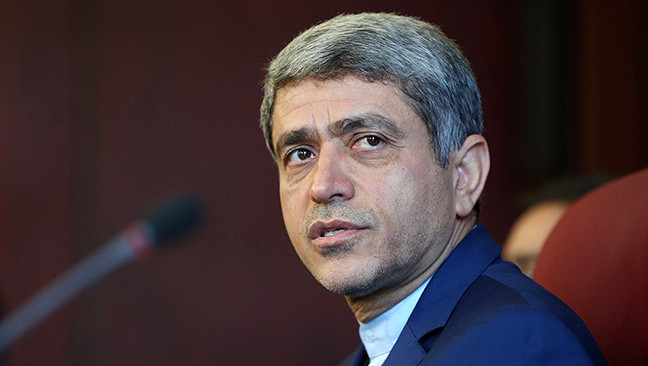PHOTO: Economy Minister Ali Tayyebina — “$45 billion in financing deals with various countries” (Ebrahim Noroozi/AP)
Struggling for economic recovery amid continuing sanctions and in-fighting over foreign investment, Iran’s Government says is looking to the international bond market for a boost.
Economy Minister Ali Tayyebnia told Bloomberg News that Iran is exploring a return to the markets after a 14-year absence. He said he expects the Islamic Republic to secure a credit rating in the “near future”, helping attract investors, as Iranian officials are “negotiating with all the rating agencies”.
The Rouhani Government had hoped that January’s implementation of the July 2015 nuclear deal would soon bring in multi-billion-dollar trade and investment deals. However, the Supreme Leader has ruled out any links with the US apart from the nuclear agreement, and he slapped down President Rouhani’s proclamation that the deal — the Joint Comprehensive Plan of Action — would quickly be followed by a “JCPOA 2″ for the economic recovery. The Revolutionary Guards, with extensive involvement in Iran’s economy including the energy sector, have been wary of the entry of foreign companies who could compete with or overtake their holdings.
The situation has been further complications by the lengthy US process to remove some sanctions and by the imposition of new restrictions linked to Iran’s ballistic missile testing. The Americans have barred access to the US financial system, and European banks and companies are wary of renewed involvement with Iran because of the fear of American punishment.
Tayyebnia said, “We are seeing the positive effects of sanctions removal on the economy….As an example, in relation to the export and production of oil, we are currently not facing any particular limits.”
However, he admitted, “In some areas we still haven’t manage to fully benefit from the outcome of sanctions removal.”
Exploratory Talks Over Rating
The ratings company Fitch visited the country in June to make an initial assessment of the economy, said the deputy governor of Iran’s Central Bank on June 30. The company had said in March that it was in discussions with the Islamic Republic.
Iran last issued international debt in July 2002. Fitch withdrew its B+ sovereign rating, the fourth-highest junk grade, for Iran in 2008 following the maturity and full repayment of Tehran’s last sovereign Eurobond. Moody’s had withdrawn its B2 rating on Iran in 2002.
“Right now, the groundwork for issuing bonds and various Iranian debt securities in international markets exists,” Tayebnia asserted.
He declined to discuss the scale of the possible sale of bonds. However, he declared that about $45 billion worth of financing agreements “with various countries” have been reached since the nuclear deal was implemented in January — though he said it could take several months to “get to the implementation stage”.
The Minister explained, “It’s natural that when a car that has stalled and wants to start moving, at first it will come under more strain and will need a higher driving force, after that it will move with more ease.”

